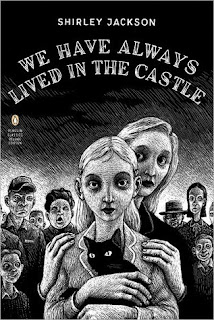We Have Always Lived in the Castle
The only Shirley Jackson I had ever read, which most people have read--"The Lottery"--has me interested in reading more of her work. I started with her last novel, We Have Always Lived in the Castle, which again features the tyranny of the mob, and also is a case for agoraphobia.
The Blackwood sisters, Constance, who never leaves the house past the garden, and narrator Mary Katherine (called Merricat) live with their infirm Uncle Julian in large house that is well off the road (the town, as is most of Jackson's works, is supposed to be North Barrington, Vermont). The family is shunned and ridiculed by the townspeople, as we learn in one of Merricat's visits to buy groceries. Only later do we learn of a tragedy when four members of the family were killed when arsenic was put into the sugar bowl. Constance was tried and acquitted.
The sisters are very happy in their odd world, though, and Uncle Julian, who was not killed but hurt badly by the poisoning, is just as dotty. It's when Cousin Charles comes to town, looking for the family fortune, that things start to go wrong. He charms Constance and is at odds with Merricat, who practices a kind of magic that involves totems: "On Sunday mornings I examined my safeguards, the box of silver dollars I had buried by the creek, and the doll buried in the long field, and the book nailed to the tree in the pine woods; so long as they were where I had put them nothing could get in to harm us."
A fire is the climax of the book, when Charles is driven away, unable to carry the safe, and the towspeople join in on a riot, destroying the sisters' things. But they respond with a kind of resilient forebearance, spending the night in Merricat's hiding place but returning and rolling up their sleeves and "neatening" the house. The upper half is gone: "Our house was a castle, turreted and open to the sky."
We Have Always Lived in the Castle is a book that mixes whimsy and dread. Though they are not supernatural, there is something unearthly about the Blackwood sisters and their house. Merricat explains: "Blackwoods had always lived in our house, and kept their things in order; as soon as a new Blackwood wife moved in, a place was found for her belongings, and so our house was built up with layers of Blackwood property weighting it, and keeping it steady against the world." The sisters are the kind of people who can't deal with reality, and the attempts by Charles to deal with them are both funny and sad--we like that he can't win, but we're sad that the sisters don't understand basic truths.
Unlike "The Lottery," certainly, We Have Always Lived in the Castle ends with a wave of humanity, a kind of "everything's going to be all right" that is always welcomed. Later this year, when my fall supernatural theme will be ghosts, I hope to read The Haunting of Hill House.
The Blackwood sisters, Constance, who never leaves the house past the garden, and narrator Mary Katherine (called Merricat) live with their infirm Uncle Julian in large house that is well off the road (the town, as is most of Jackson's works, is supposed to be North Barrington, Vermont). The family is shunned and ridiculed by the townspeople, as we learn in one of Merricat's visits to buy groceries. Only later do we learn of a tragedy when four members of the family were killed when arsenic was put into the sugar bowl. Constance was tried and acquitted.
The sisters are very happy in their odd world, though, and Uncle Julian, who was not killed but hurt badly by the poisoning, is just as dotty. It's when Cousin Charles comes to town, looking for the family fortune, that things start to go wrong. He charms Constance and is at odds with Merricat, who practices a kind of magic that involves totems: "On Sunday mornings I examined my safeguards, the box of silver dollars I had buried by the creek, and the doll buried in the long field, and the book nailed to the tree in the pine woods; so long as they were where I had put them nothing could get in to harm us."
A fire is the climax of the book, when Charles is driven away, unable to carry the safe, and the towspeople join in on a riot, destroying the sisters' things. But they respond with a kind of resilient forebearance, spending the night in Merricat's hiding place but returning and rolling up their sleeves and "neatening" the house. The upper half is gone: "Our house was a castle, turreted and open to the sky."
We Have Always Lived in the Castle is a book that mixes whimsy and dread. Though they are not supernatural, there is something unearthly about the Blackwood sisters and their house. Merricat explains: "Blackwoods had always lived in our house, and kept their things in order; as soon as a new Blackwood wife moved in, a place was found for her belongings, and so our house was built up with layers of Blackwood property weighting it, and keeping it steady against the world." The sisters are the kind of people who can't deal with reality, and the attempts by Charles to deal with them are both funny and sad--we like that he can't win, but we're sad that the sisters don't understand basic truths.
Unlike "The Lottery," certainly, We Have Always Lived in the Castle ends with a wave of humanity, a kind of "everything's going to be all right" that is always welcomed. Later this year, when my fall supernatural theme will be ghosts, I hope to read The Haunting of Hill House.



Comments
Post a Comment